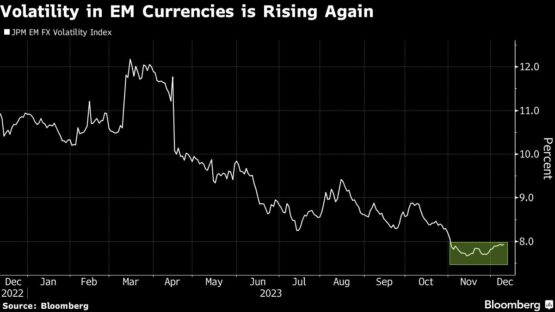Emerging-market equities and currencies edged lower on Monday ahead of a week packed with key economic data and rate decisions at major central banks that will test the market’s optimism for easing monetary policy in the US in 2024.
MSCI’s index for developing nation stocks trimmed losses after falling as much as 0.9%, while the gauge of currencies fell 0.3%, the lowest level since November 17 on a closing basis.
ADVERTISEMENT
CONTINUE READING BELOW
“It’s a relatively quiet session, with no major movements in rates and currency. There is a sense of cautiousness ahead of the Fed and the possibility that Powell could be a bit less hawkish. Currencies depreciated a bit and rates increased, but probably it is just positioning ahead of a rather hawkish surprise,” said Marco Oviedo, a strategist at XP Investimentos.
The US CPI report will be released on Tuesday, a day before the last scheduled Federal Reserve decision of 2023. Options traders have begun raising their expectations of currency swings in anticipation of the two events. The JPMorgan Emerging Market Volatility Index is hovering around its highest levels in a month.
Softening US inflation and employment data in the past month have convinced investors that the Fed is done raising rates and ignited bets that cuts of at least 125 basis points were in store over the next 12 months. Traders scaled back those wagers to about 110 basis points of easing after last week’s nonfarm payrolls data.
“The strong jobs report Friday brings the dovish Fed narrative into question,” said Win Thin, global head of currency strategy at Brown Brothers Harriman & Co in a note to clients. “This week is likely to bring a hawkish hold from the Fed as well as elevated core CPI readings in the US.”
In credit markets, investors will watch for developments in Ethiopia. The nation is set to join Zambia and Ghana as a sovereign defaulter, with an interest payment falling due to its bondholders on Monday that the state says it won’t meet.
EMTA, the emerging market trade association, is recommending that all trades on Ethiopia’s 2024 bonds entered into on or after December 11 should trade flat, unless otherwise agreed.
Meanwhile, Guatemala’s dollar bonds were the biggest losers on Monday among emerging-market sovereigns after prosecutors called for the invalidation of Bernardo Arevalo’s presidential election victory, only for the electoral authority to immediately reject the claims.
ADVERTISEMENT
CONTINUE READING BELOW
Emerging currencies
In Egypt, money managers are already bracing for what comes next as voters head to the polls. President Abdel-Fattah El-Sisi is set to win again, and is then likely to oversee a painful devaluation of the currency.
Also in Africa, the Nigerian naira rose against the US dollar, after weakening to its lowest level on record in official trading, as a shortage of US dollars persisted despite promises by the government to boost supply.
Across the globe in Argentina, the South American country’s central bank is restricting access to dollars at the official exchange rate until President Javier Milei’s administration announces the first measures of a promised shock-therapy program aimed at eradicating inflation.
The monetary authority said Monday that the country’s official currency market would operate with limited transactions to give Milei’s team time to comply with administrative procedures and implement its own policy. Investors are anticipating a large devaluation in the next few days.
“Investors are pricing in these long needed changes and what it means for growth and access to capital markets in the future,” said Oren Barack, managing director of fixed income at New York-based Alliance Global Partners.
© 2023 Bloomberg

